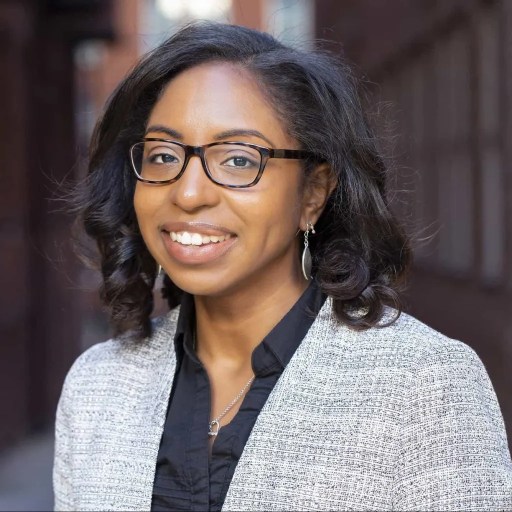Behind just about every racial disparity — in health, education, housing, access to voting, economic well-being — is hundreds of years of American history, including very recent history, that got us here.
It’s something April Simpson centers in her work as a senior reporter covering racial equity for the Center for Public Integrity because it’s essential to an accurate understanding of most issues facing the country today and to potential solutions.
Last year, she published an investigation into COVID-19’s disproportionate impact on multi-generation households, which are disproportionately people of color. It was just recognized by the National Association of Health Care Journalists as among the best journalism in the country about health policy.
In December, she exposed deep health disparities between communities just across the border from each other in Louisiana and Mississippi, driven by one state’s decision to take advantage of Obamacare’s Medicaid expansion provision and the other’s stubborn rejection.
This year, Simpson is reporting on the plight of Black farmers.
Simpson joined Public Integrity in October 2020 after covering rural issues for Stateline, an initiative of the Pew Charitable Trusts. Before joining Pew, Simpson was an associate editor of Current, where she covered public media and won recognition for her #MeToo investigation of a veteran reporter.
Simpson was a Fulbright fellow in Botswana, Eastern Democratic Republic of Congo fellow with the International Women’s Media Foundation and Innovations in Food and Agriculture fellow with the National Press Foundation. She is a graduate of Smith College and the London School of Economics and Political Science.

We asked about her career path and recent work at Public Integrity.
What inspired you to become a journalist?
When I was 11 years old, my family moved from Yonkers, New York, to Homosassa, Florida. It was a huge culture shock for me — moving from a place that was racially diverse and just outside of New York City to a small town an hour outside of a major city, where you couldn’t get anywhere without a car. Citrus County, Florida, was maybe 95% white back then, but it was still racially segregated and culturally southern in ways that I did not understand. Those first few years were hard, but things turned around my sophomore year of high school when a teacher recommended I take the newspaper class. Journalism empowered me to ask questions of people and institutions. I worked for my local newspaper during college and gained a broader understanding of my community. I knew early on that journalism was what I wanted to do.
How have your experiences as a fellow overseas contributed to the way you serve as an investigative journalist for Public Integrity?
The opportunity to live and report from abroad helped me understand how interconnected the world is. I could also see the ways in which mainstream U.S. media can do a better job of covering international issues, especially when those issues are about communities of color. Being a woman of color, but also an American in countries with a history of British colonialism, taught me more about power and how it works. Because of who I am, and all those experiences, my journalism tries to get at the historical underpinnings of an issue. I try to listen more than I talk, to humble myself and to wrap my head around the many rigid structures that essentially deprive people and communities of economic and social progress.
What continues to surprise you as you dive deep into issues of racial equity?
I’m still surprised by how much history repeats and by how some of the rhetoric of our legally segregated past continues to resonate today. There are racial disparities in just about everything, but there are also proven solutions to address them. I’m still surprised by how much our heritage can get in the way.
Public Integrity relies in a significant way on donations from readers. What’s your pitch for why people reading this should support Public Integrity’s work?
Few organizations are so intimately committed to covering inequality in its many forms. And even fewer invest time and space in stories that strive to cover inequality through a lens that centers people of color. The people here are smart, hard working and passionate about the mission. Leadership has shown a great deal of empathy through this never-ending pandemic. But we can’t expose the causes and effects of something as stubborn as inequality alone. It’s a team effort. We need your help.
